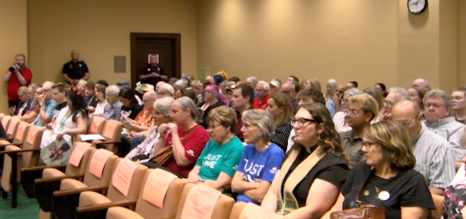Constitutional amendment aims to change governing structure of Nebraska education board
LR278CA would eliminate State Board of Education, and governor would appoint education commissioner
LINCOLN, Neb. (KLKN) – The State Board of Education having power taken away, it’s such a hot topic that the Education Committee at the legislature heard a second bill aimed at changing the governing structure.
On Tuesday, Sen. Lou Ann Linehan introduced a constitutional amendment that would eliminate the State Board of Education and allow the Governor to replace it by appointing a commissioner of education. She feels that having a clear boss, in this case, it would be the Governor, helps the people know who to hold accountable.
“When everybody is in charge, nobody is in charge. It’s just a basic management rule. So when the charts go sideways and these ways then people don’t know who to hold accountable,” said Sen. Linehan.
Sen. Linehan feels that by giving responsibility to the Governor and a Commissioner, outcomes could happen much quicker.
“The more people you have managing you the less you can react immediately, like with the teacher’s crisis and not having enough teachers if you had a governor who walked into his head of education and said do something about this, he would expect some kind of plan within days, we’ve gone two years here with no plan,” said Sen. Linehan.
The current State Board of Education Commissioner is currently serving his 8th year in that seat, he and the board oppose the constitutional amendment.
“Really the job is almost too big to be able to do, you know and do well and really get feedback from the citizens. There is a lot of important citizen voice that comes from the board of education and gives us a good chance to engage with the public in different ways. We have plenty of public engagement, but it’s actually a good thing right. These are the intentions of the state board we have a forum to do that work. It’s really been important that we do that,” said Matt Blomstedt Ph.D. Commissioner.
In 32 states across the nation, the governor appoints a commissioner of education, and the legislature confirms it.
“We are the only state that does a non-partisan ballot that elects their school board. We are much an outlier and I just think, when we originally did this, from the history I’ve read, it was because they wanted them to be closer to the people, they are not closer to the people,” said Sen. Linehan.
Opposers feel this would take away the public voice.
“Other agencies who are under the governor don’t tend to have the same type of public comment opportunities that engage overall. The State Board also plays an important function in that they do hearings, they have judicial roles and responsibilities, that would have to be reconstructed in a different way. Other agencies may be able to do that, but it’s not the same,” said Blomstedt.
Sen. Linehan explained that the State Board of Education is in charge of money that they don’t have to collect, as they receive funding from the government. She feels it’s causing a disconnect between the people and the board.
“When you are actually taxing people and taking their money, your obligation and what you do with that money is a lot closer to the people,” said Sen. Linehan.
Sen. Linehan said she was thinking of a way to change things, even before the Board of Education started talking about state sex education standards.
“I’ve actually thought for a long time, maybe even before I was elected to this job, I don’t like the government structure of public education in Nebraska,” said Sen. Linehan.
“It’s not the first time something like this is being proposed, in fact, it’s actually the third time in my time as commissioner that it’s been proposed. I don’t think it’s about current events, it’s about what is the best structure for an education system overall,” said Blomstedt.
This is the second time this year that the education committee heard an idea that would take power away from the State Board of Education, and change the way they are run. So far no immediate actions have been taken on either bill. They must first pass the committee before they could be heard on the debate floor.



